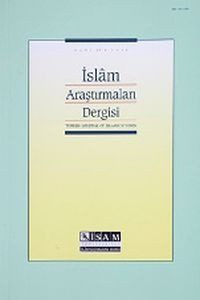Abstract
Bu makalede Nasîruddîn Tûsî’nin nefis teorisinde nefsin soyut bir cevher oluşu meselesi incelenecektir. Makalenin temel sorunu, Tûsî’nin nefsin soyut bir cevher oluşunu nasıl temellendirdiği ve daha önce İslâm filozofları tarafından bu konuda ileri sürülen argümanlara yönelik eleştirilere Tûsî’nin sisteminde yanıt bulunup bulunmayacağı meselesidir. Tûsî metafiziği ve ahlâk düşüncesinde hayatî bir öneme sahip olmasına rağmen bu mesele, daha önce herhangi bir çalışmaya konu olmamıştır. Her ne kadar Agil Şirinov’un Nasîruddîn Tûsî’de Varlık ve Ulûhiyyet başlıklı doktora tezinde Tûsî’nin nefsin soyut bir cevher olduğu tezini benimsediği hususuna işaret edilmişse de, onun nefsin soyut oluşunu nasıl temellendirdiği -tezin sınırlarını aşacağından- ayrıntılı olarak tartışılmamıştır.
References
- Agil Şirinov, Nasîruddîn Tûsî’de Varlık ve Ulûhiyyet (doktora tezi), Marmara Üniversitesi Sosyal Bilimler Enstitüsü, 2007.
The Foundation of the Notion of Nafs Being an Abstract Substance in the Thought of Nasir al-din Tusi
Abstract
This article deals with the matter of the nafs being perceived as an abstract substance in Nasir al-din Tusi’s theory of nafs. The basic problem examined in this article is how Tusý established the foundations of the idea of nafs as an abstract substance, the evidence he presented in this matter, based on the sources, which thinkers and philosophers of Islamic thought he based his arguments on, and whether or not criticisms of the arguments concerned with this matter by earlier Islamic philosophers are answered in Tusi’s system. The basic claim of the article is based on the views and evidence presented in connection with this matter by Ibn Sina (d. 428/1037) and Ibn Miskawayh (d. 421/1030); we can find, to a certain degree, answers to the criticisms of Ghazzali and Fahr al-din al-Razi made to Nasr al-din Tusi in this matter.
References
- Agil Şirinov, Nasîruddîn Tûsî’de Varlık ve Ulûhiyyet (doktora tezi), Marmara Üniversitesi Sosyal Bilimler Enstitüsü, 2007.
Details
| Primary Language | Turkish |
|---|---|
| Subjects | Religious Studies |
| Journal Section | Makaleler |
| Authors | |
| Publication Date | January 1, 2008 |
| Published in Issue | Year 2008 Issue: 19 |

